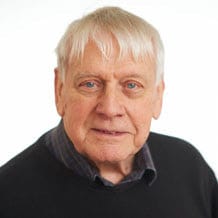Online Working Memory Week Welcomes Prof Alan Baddeley

We're delighted to welcome Prof. Alan Baddeley, one of the forefathers of working memory as keynote speaker for this year's Online Working Memory Week. A week long series of free talks on the topic of working memory and its importance.
Prof. Alan Baddeley was among the first to define the model for working memory with his colleague Dr Graham Hitch in 1974 when they tried to tackle the question ‘What is working memory for?’ The term working memory had already been coined in the 1960’s but there had not been a great deal of research to explain exactly what it was. There were a number of other researchers who were investigating memory and how it worked, this was often completed with amnesic patients as the subject. Finding subjects who had amnesia was tricky as cases of amnesia are quite rare.

Baddeley & Hitch decided to take students and turn them into subjects, not by ‘clunking them on the head’ as Prof Baddeley explains, but by giving them tasks that would work on specific parts of the brain. Students would be given a short term memory task, for example remembering and repeating a sequence of digits, whilst simultaneously asking them to complete a reasoning task. They had anticipated that this would wipe out performance in the participants but it did not, they found that the greater the number of digits they held the greater the number of errors, but the participants were able to complete the tasks.
This then led them to identify three key components of memory that they went on to investigate further:
- Central Executive: Drives the whole system (e.g. the boss of working memory) and allocates data to the subsystems (VSS & PL). It also deals with cognitive tasks such as mental arithmetic and problem solving.
- Visuo-Spatial Sketchpad (inner eye): Stores and processes information in a visual or spatial form. The VSS is used for navigation.
- The Phonological Loop is the part of working memory that deals with spoken and written material. It can be used to remember a phone number.
To learn more about these aspects of working memory, make sure you sign up to Professor Alan Baddeley’s webinar presentation on Wednesday 11th November.
